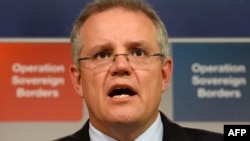Cambodia's foreign affairs ministry said Wednesday that it will sign a controversial refugee resettlement deal with Australia later this week. The deal, which has been shrouded in secrecy since the idea was first aired in February, will see an unknown number of refugees sent to Cambodia from at least one of Australia's offshore detention facilities.
In a brief press release, the Cambodian government said Australian Immigration Minister Scott Morrison would sign the memorandum of understanding on Friday during a visit to Phnom Penh.
The controversial deal could see as many as 1,000 refugees currently being held in detention on the Pacific island of Nauru eventually sent to Cambodia. Phnom Penh has said it will only accept refugees from Nauru if they come voluntarily.
A spokesperson for Scott Morrison's office confirmed that he would visit Cambodia this week, and that he would sign "an agreement" with the Cambodian government.
The proposed resettlement deal, which has been in the works for months, has drawn criticism from rights workers, opposition politicians and the U.N. Refugee Office since news broke in February that Australia had asked Cambodia to take in refugees.
Cambodia, a post-conflict nation with weak social services, has a poor human rights record, and some have queried why one of the world's richest nations is trying to send refugees to one of the poorest.
Sister Denise Coghlan, head of the Jesuit Refugee Service, which has worked on refugee issues in Cambodia since 1990, said Australia is abrogating its moral responsibility by sending the refugees to Cambodia.
"The fact that Cambodia is willing to welcome refugees is good - I mean that's a good thing. But I think their capacity to accept people who have been severely traumatized both by the situation in their own country and by their treatment by the Australian government - first on places like Christmas Island and then Nauru - these people have now been left in a very traumatized and psychologically weak situation.
And I think the capacity of the mental health facilities in Cambodia to really cope with this kind of situation is pretty weak," said Coghlan.
There are also longer-term concerns over how the refugees will cope with living in a country where a large number of Cambodians are themselves displaced, including thousands of villagers who have been evicted from their land. In addition, refugees will face obvious language barriers.
There is still little known about the specifics of the deal, including when the first refugees will arrive and where they will live.
"The other thing is the job prospects for people. The job prospects for kids coming out of school, the job prospects for young people, are pretty minimal here, and to add another group of people who are starting to look for jobs - it's another burden for the Cambodian economy and the Cambodian government," said Coghlan.
She said refugees must be housed in the community, not in institutionalized accommodations, and must have the freedom to come and go as they please.
The conservative government in Australia, which is one of Cambodia's key donors, came to power a year ago promising that it would be tough on asylum-seekers. Australian officials claim that many of those seeking asylum are instead merely economic migrants.




